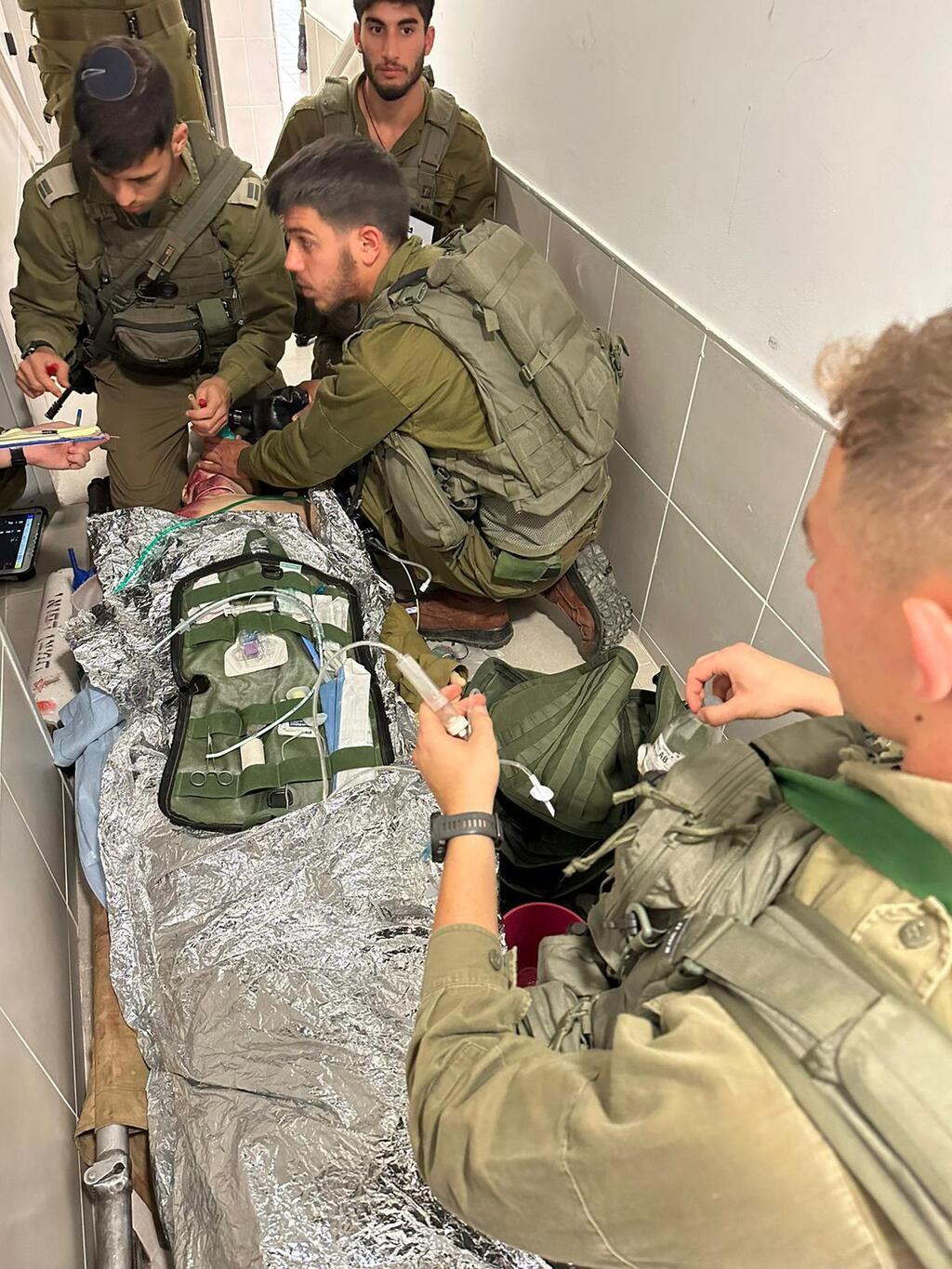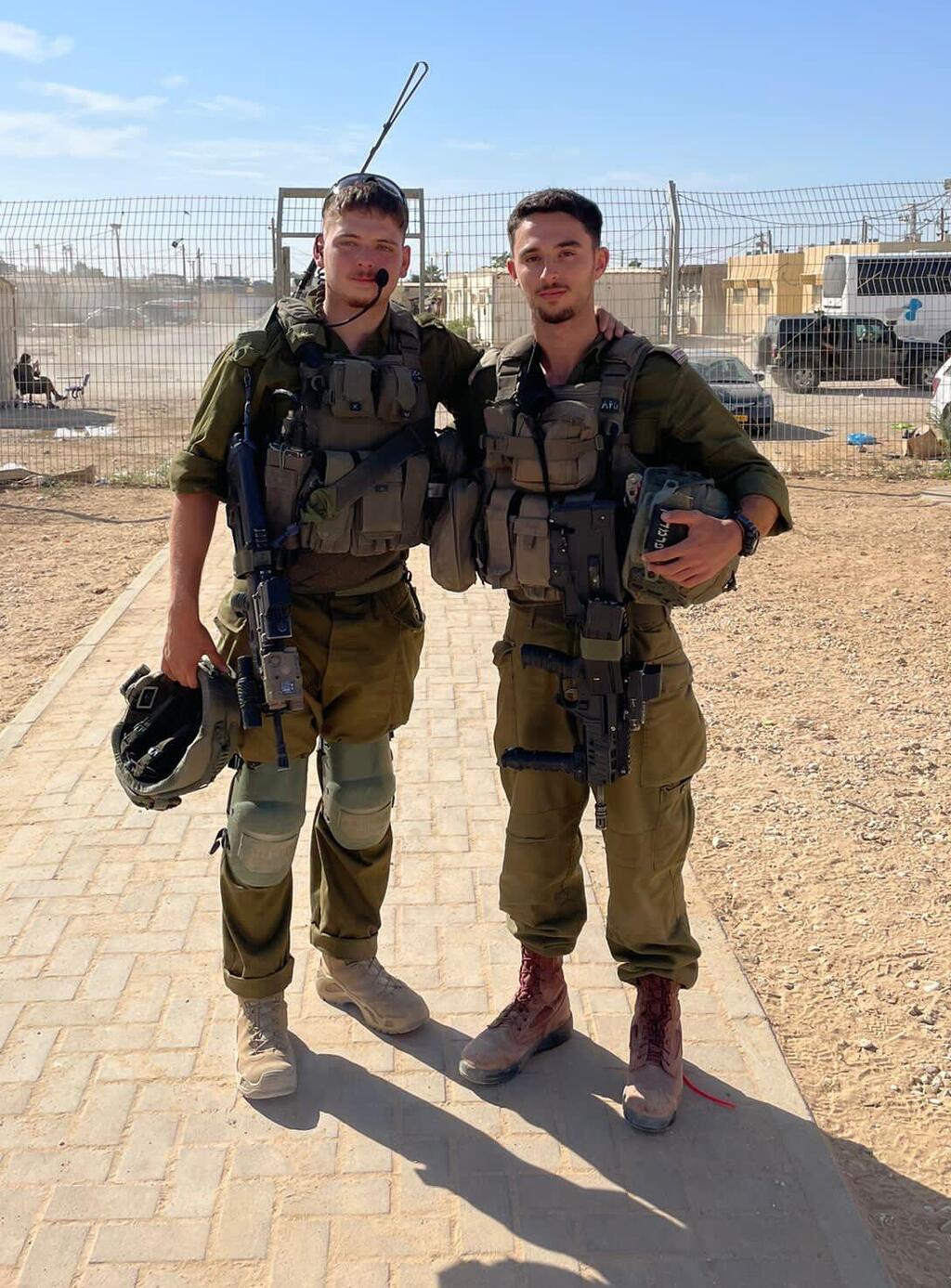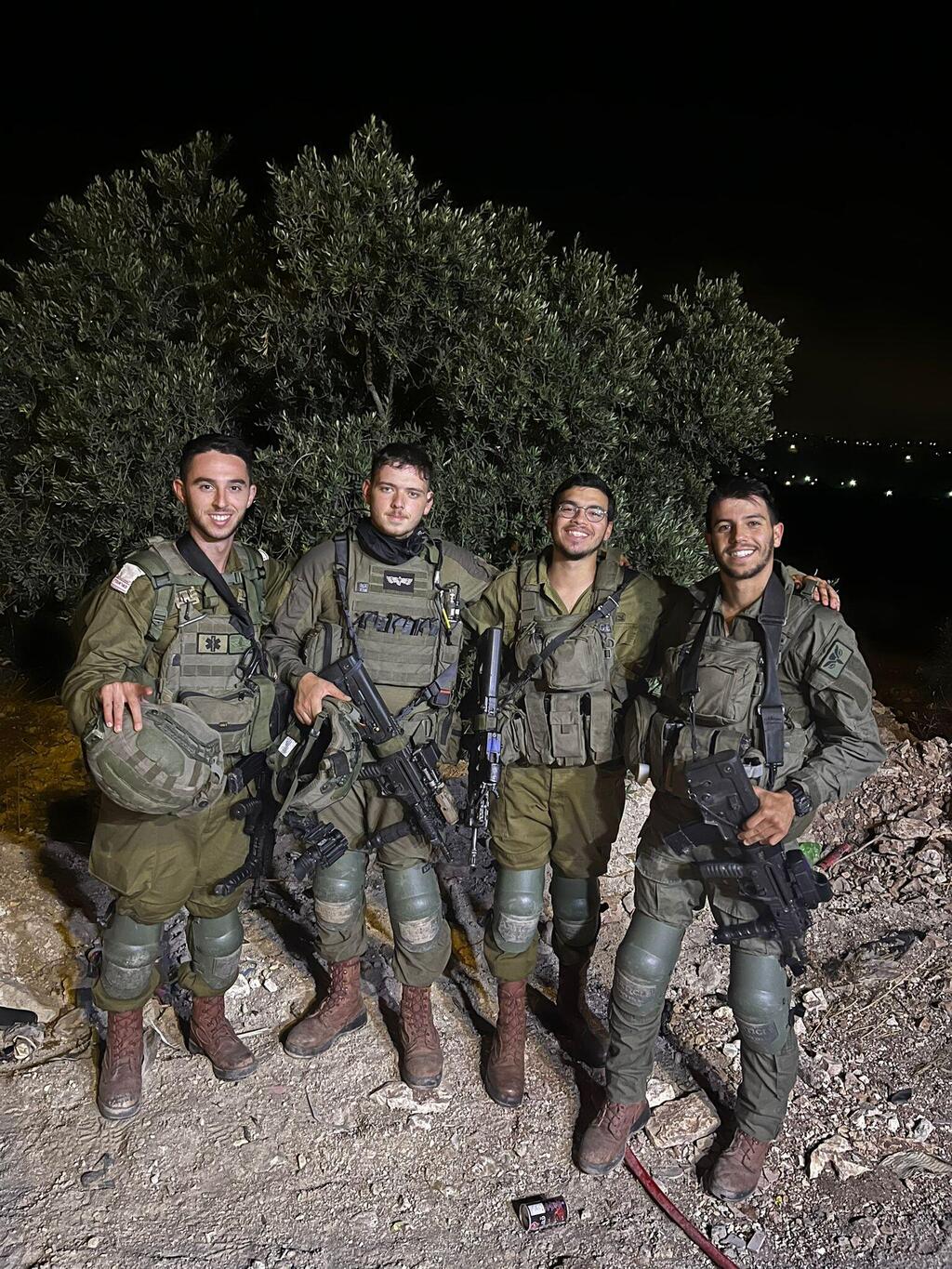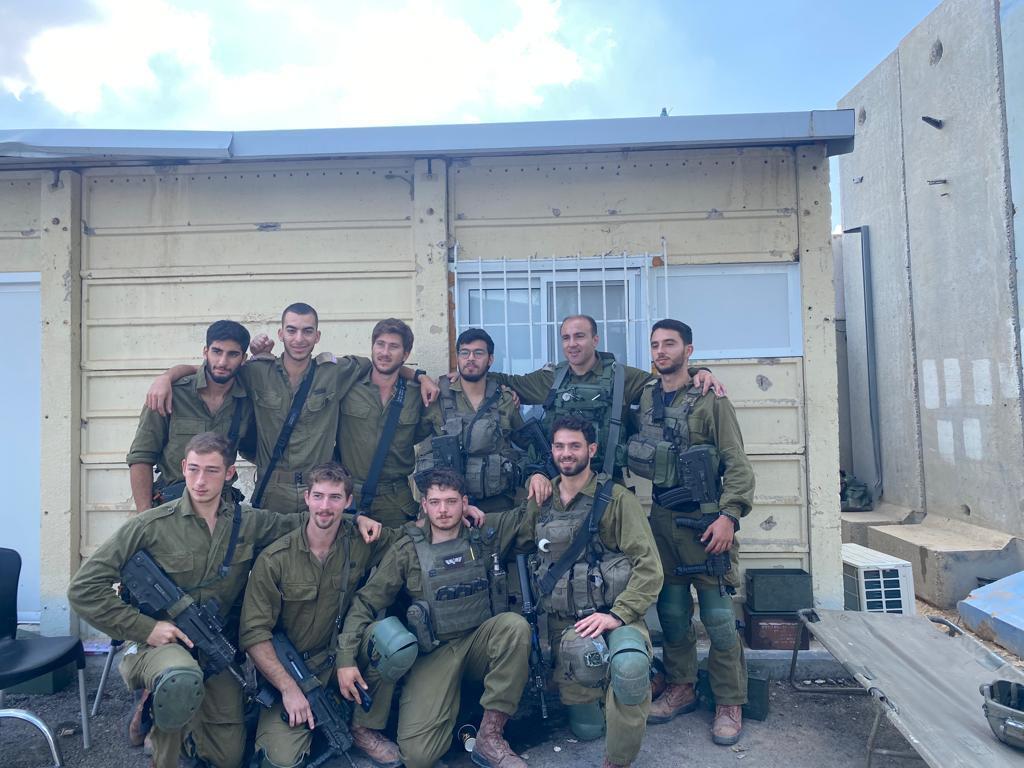"We spent Shabbat at the base, we woke up early in the morning as usual, like every other day, for 'dawn alert', we were half asleep inside the Wolf (a military personnel carrier) and we were listening in the communication to the forces. Around 6:20am we heard crazy booms, the alert sirens were not activated, and rockets were fired non-stop on the Kerem Shalom outpost. Meanwhile, we heard on the communication that terrorists were approaching the fence, as they were spotted by the military observers, the rockets had already fallen a few meters away from us, and the blast was terrible."
More stories:
At this point, the military paramedic of the Nahal infantry brigade, Staff Sergeant Dor Ashkenazi, 21, and paramedic, Sergeant Almog Oren, 21, made a dramatic first decision. "We decided to enter the nearest shelter. We assumed that there must have been wounded in the area. We wanted to be available, and the dilemma was immense, but we decided to get off the Wolf to the nearest shelter. We had no doubt that this was a mass-casualty event. Despite the initial instinct to open the clinic and treat the wounded there, where all the medical equipment was, we realized that it was dangerous. There were many wounded, and they were in bad shape."
4 View gallery


The battalion aid team treats a wounded soldier in the field
(Photo: IDF Spokesperson's Unit)
Thus, Dor and Almog chose a small shelter, with a very narrow opening, that would serve as a center for collecting and treating the wounded. During the fighting, the shelter transformed into a field hospital, where the wounded were treated and prepared to be airlifted to the hospital. From the shelter, which was half open, Dor and Almog could notice dozens of terrorists racing toward the outpost.
"The paramedics and I engaged in a heavy shootout, and then additional fighters, who were still in bed in their boxer shorts, joined the fighting. We started firing at them to prevent them from occupying the outpost," says Ashkenazi.
"We were notified on the communication of an injured person inside the outpost located at a relatively remote place." Reaching that wounded, under constant fire and covered by the commander of the sniper forces, was complex. Bravely and calmly, while terrorists were shooting at them, they managed to get to that wounded soldier and put him in the shelter.
"He suffered from a limb injury; he was hit by a bullet in his right hand. Almog the paramedic started treating the wounded and we, me and the two paramedics, tried to reach the other wounded. At the same time, I spotted a terrorist barreling toward the girls' residence, I shot him, and he fell to the floor. I contacted the officers because I realized that the terrorists were trying to surround us."
4 View gallery


Medic Staff Sergeant Dor Ashkenazi (left) and paramedic Sergeant Almog Oren
(Photo: IDF Spokesperson's Unit)
Staff Sergeant Dor Ashkenazi asked one of the fighters to help them providing covering fire. They jumped in pairs, "just like in the military recruit training,", in order to bring the severely wounded to the same small shelter under mass shooting and gunfire. Almog and I reached each and every wounded, to get a clearer picture of the situation. We built an orderly table, concluding and planning the next moves," says Ashkenazi, "we managed the event and treated it as if it was another one of the dozens of exercises we did."
A few weeks ago, the brigade's medical chief officer trained the Nahal fighters of the battalion aid station in advance of the IDF fitness championship, which was supposed to take place last week. The entire paramedic team practiced treating dozens of wounded under fire, each of the wounded suffering from a different medical issue. Never in their wildest dream did they imagine that the same training would prepare them to treat and save the lives of ten of their fellow battalion members.
"First of all we are fighters, and then we are caregivers," explains Ashkenazi, "The first step in treatment, within the battalion aid station, is to make sure you are in a situation to provide such treatment." I, as the battalion chief paramedic, should be the manager of the event, and serve as the commander of the medical alert staff. With me, there is a paramedic who is the senior medical authority in the event, and in addition, there are two paramedics who provide assistance."
Dilemmas when treating under fire
The battle at the Kerem Shalom outpost lasted about six hours. Six hours during which no help was provided to evacuate the wounded despite their requests. "During that time, much of our medical equipment was running out. For example, we ran out of plasmas, the life-saving blood doses, because of the number of severely injured people, and we also ran out of oxygen cylinders."
"There is a fence that separates me from the orchard where the rescue helicopter is supposed to land. There are still terrorists in the area. Without much thinking, we decided to take the Wolf that belonged to the sniper team and break through the fence. We managed to make a huge hole in it through which we transferred the wounded to the helicopter"
The two realized that they were on their own, that no help would be coming soon, and they had to somehow get along and be creative. They decided to call the chief medical officer at the West Bank, who is a senior doctor, and he helped them remotely but professionally to cope with the surgeries they were doing in poor conditions and under constant gunfire.
Paramedic Almog Oren recalls one special case, "we had to perform a tracheostomy (a surgery to create a hole in the windpipe that provides an alternative airway for breathing) to save a soldier's life. It was challenging to do it on the sand, in the small shelter located in the field, with other wounded people around; even when doing it in a hospital it's complicated, but we didn't even think about it."
"We felt deeply frustrated because each time we had to improvise to keep the wounded alive," recalls Ashkenazi, "the Wolf was hit by several RPG missiles and thus all the instruments and medical equipment that were inside were completely burned. At the outpost, there was an ambulance that belonged to the Southern Division, but its key was inside the burnt-out Wolf. So, I ran to the ambulance and with the barrel of the rifle I broke the window in order to extract the oxygen cylinder that was inside, a cylinder that weighs about 30 kg, and I carried it to Almog who treated the wounded."
The improvisations did not end there. The two ran through all the rooms in the outpost to collect remnants of medical supplies, from the bag of a medic who went home for the weekend, and other equipment that they managed to locate by chance in some of the rooms.
Hope came when Ashkenazi received a phone call from the Air Force Command, telling him that an evacuation helicopter was on its way. "They called my personal phone, not through the communication. The Air Force pilot calls me, she is flying a Sikorsky Sea Stallion and asks me where she can land, I send her on WhatsApp a location of an orchard that I located near the outpost," he says.
4 View gallery


Left to right: Medic Nitai Castorianu, medic Guy Lamb, medic Dor Ashkenazi and paramedic Almog Oren
(Photo: IDF Spokesperson's Unit)
The Kerem Shalom outpost, where fierce fighting was still taking place, is surrounded by a fence. "There is a fence that separates me from the orchard where the rescue helicopter is supposed to land. There are still terrorists in the area. Without much thinking, we decided to take the Wolf that belonged to the sniper team and break through the fence. We managed to make a huge hole in it through which we transferred the wounded to the helicopter."
A team of the 669 search and rescue unit, along with paramedics and doctors who jumped from the helicopter, helped Dor and Almog evacuate the wounded within minutes. "It was very fast but very difficult. The wounded were inside the shelter and the opening was very narrow. Some of them were unconscious and some of them could not walk. We took military blankets on which we placed the wounded, and that's how we were able to get them out of the narrow opening onto the stretcher and into the helicopter."
As soon as they evacuated all the wounded, instead of breathing a sigh of relief, Dor and Almog knew that they had to get organized and prepared for the next wounded. "The first thing we did was to figure out how we were getting new equipment. We divided tasks. Each one went to look for equipment from anywhere in the base, we cleared the area and cleaned the shelter, we prepared ourselves for another mass-casualty event. When you are a paramedic, you can never know when and how many more wounded to expect."
Aunt and cousin murdered in Kfar Aza
Dor, who acted with extraordinary composure and was in command and still in command of the battalion, was forced to deal also with terrible personal news. "While Almog and I were taking care of the wounded, my mother informed me that they had lost contact with my aunt and cousin who lived in Kfar Aza, the late Aran and Tova, who were murdered while in the safe room at their home," he said with pain.
"While Almog and I were taking care of the wounded, my mother informed me that they had lost contact with my aunt and cousin who lived in Kfar Aza, the late Aran and Tova, who were murdered while in the safe room at their home"
Dor and Almog dream of becoming doctors. "We have a special bond," they admit. "We look each other in the eyes, look at the control chart and we know exactly what we need to do. We know how to calm each other down and strengthen each other, despite the frustration."
Almog shares that a mass-casualty event is something you are trained for during the entire military service. "When that moment comes, as a caretaker, it's your time to overcome yourself. You are supposed to trust your instincts. There's no time to stop. You simply go over the protocols you know by heart that are running in your head," he says.
Staff Sergeant Dor Ashkenazi was supposed to go on discharge leave this week. Instead, he continues to save lives with the brigade's paramedic, Almog Oren, and with the other paramedics of the battalion team.
These days they are located at a training base in the south. "This event provided us with a lot of professional experience. It increased our self-confidence in terms of how to treat the wounded in real time. But we continue to train for the worst-case scenarios," shares Oren, "an event like this changes your perception of everything. Suddenly you understand the essence of our duty. After experiencing a real event, we look at the training from a different angle. We learn our lessons and draw our conclusions".
'Proud we did our job'
The world of medicine is not foreign to young Oren, whose older sister is a doctor. "It took me a few days to share this story with the family, it's a difficult event and it took me a few days to process it. But our families are proud. My sister was enthusiastic about my performance, I'm proud that we did our job, the things we were trained for and that we succeeded in performing the task assigned to us."
"Two soldiers who suffered from limb injuries that we treated came this week to visit us at the training base. And it was exciting to see them walk on their feet - it was fulfilling in a way we cannot describe," Almog shares.
Dor adds, "All the wounded who were treated by us are currently recovering. And I say this with great pride. I spoke with another one of the wounded who was hit by an RPG and he said that he is no longer bedridden. He is starting to recover. During the whole conversation, he just kept saying how much he appreciates us and how great we are. It puts things in perspective, it shows that we really saved lives. This fills us with motivation to continue, and we understand how important our job is."
Dor's message to the next generation and to the other medical teams: "Always be prepared for the next complex event. Don't say, 'Well, it won't happen on my shift,' but rather prepare yourself for the worst-case scenario. As caregivers, bear in mind that every soldier is a world onto themselves."



